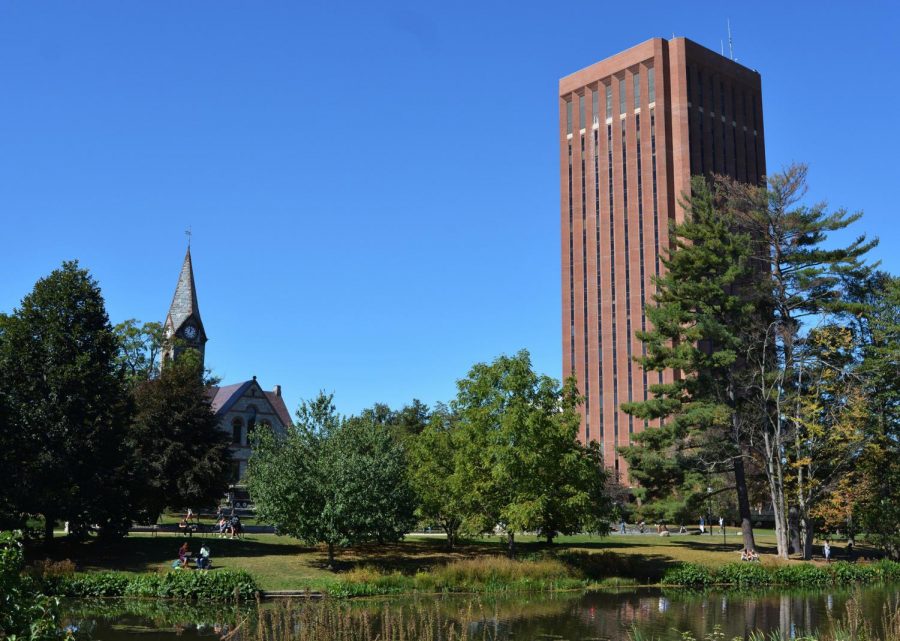Author and writer for The New Yorker Rich Benjamin gave a speech entitled “Color of Tomorrow: Community in the Age of Resistance and Trump” in Herter Hall this past Tuesday.
Benjamin is the author of “Searching for Whitopia: An Improbable Journey to the Heart of White America.” In the past two years, Benjamin has done research on white America by living in three different communities – Coeur d’Alene, Idaho, St. George, Utah and Forsyth County, Georgia – which meet his requirements for “Whitopia.”
“These three main requirements of ‘Whitopia’ are that the community has grown by six percent since the year 2000, the majority of that growth has come from white migrants, often up to 80 percent and lastly, that the community has a certain feel – a charm to it, which attracts more and more people and makes it decidedly desirable,” Benjamin explained.
As a trained cultural anthropologist, Benjamin “dug in, figured out who [he] needed to meet, who [he] needed to see [and] who the power brokers are in the community.” It was more than just sitting in on meetings, he added, and it involved “a fair bit of socializing.”
“One of the lessons of ‘Whitopia’ for me is the extent to which interpersonal race relations have improved in this country – the way we treat each other one on one as human beings, which is radically different than our parents’ generation,” Benjamin said. “Another lesson is how we relate to each other as human beings, the ways in which this country is as segregated today as it was in 1970.”
Amherst resident Maggie Bullock commented that she attended the lecture as race and communities in America is popular in today’s climate.”
Benjamin encouraged the audience to think of examples of what it means to “show up” for one another in terms of a community.
Several audience members said they had attended the lecture out of interest it would relate to classes they were currently taking at the University of Massachusetts.
Jillian Foley, a marketing and French senior, said that her class focuses on different family background and “how race and socioeconomic positions can affect one’s opportunities and thus the chances they get. I’m interested to hear if this talk today will discuss that,” Foley said.
Sociology senior Julia Copponi and psychology senior Theresa Burke said that in class, they were “learning about comparing the topic of how children of color are raised and how that affects them and their opportunities.”
“We’ve been looking into the positive nature and outcome of these influences,” Copponi added.
Benjamin addressed this latter point that communities can maintain a “physical presence” and a “mental presence.”
“I think that during the Charleston massacre, when the churchgoers were slain in church – people showed up for each other, people showed up as a community and said here’s what we can do to help, and here’s what we have to offer,” Benjamin said.
He added: “I’d like for us to think about what community means, and what also it means to be present, physically and mentally, as well as absent.”
Jacqueline Hayes can be reached at [email protected].




















Amy • Dec 5, 2018 at 6:22 am
How many people likely showed up for this event? 10-20? Versus 1,200 for sean spicer. I hate to break it to radical liberals at Umass, people don’t like racism.
“Whitopia” is not only racist it’s also the typical liberal drivel that people don’t care about. The state of liberals and left today are like people who are given microphones they don’t relinquish but keep shouting into them although nobody is listening.
On more positive news, the author of Diversity Delusion, Heather Mcdonald is coming to umass!!
This is great news and in the united states of america our country is strongly founded on dissent and also debate. You just don’t get to as liberals do spout your opinions and ideas and beliefs as if they are ‘right’ like a decree of the monarchy; you have to prove them, convince others, etc. Liberals are losing on this front and when the microphones(academia,msm) are either taken away or equally shared, liberals will lose entirely in the ‘culture war’ and ‘war on ideas’.